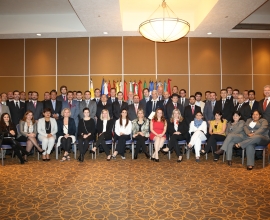The Euro-Latin American Tax Education Network: united by a new tax culture
EUROsociAL supported the creation of a Tax Education Network made up of tax and educational institutions in the European Union and Latin America. The network has a governance model and an Internet portal: educacionfiscal.org
The tax administrations of Bulgaria, Austria, Finland, Italy, Spain, El Salvador, Mexico, Brazil, Honduras, Uruguay, Ecuador and Guatemala, among others, have joined.
The tax administrations of Latin America and the European Union are increasingly aware that, in addition to transmitting the risk of penalty to the taxpayer, other actions exist that can achieve better tax compliance through improved service to citizens and tax education strategies designed to make citizens internalise voluntary tax compliance as a personal conviction.
Increasingly tax education, linked to democratic values and the exercise of citizenship, has been included as one of the strategic lines of almost all the region's tax administrations, with the support of the Ministries of Education and universities, among other actors.
In response to the demand of the countries and within the framework of EUROsociAL, the European Commission cooperation programme, creation of a Tax Education Network (REF in its Spanish acronym) was formally promoted. Designed to be a specialised, flexible and participatory space for learning among European Union and Latin American tax and educational institutions, it seeks to strengthen public policies for tax education.
The REF has the following main objectives:
- Emphasise the importance of tax education as a public policy to achieve more prosperous and cohesive societies;
- Foster experience exchanges to strengthen tax education initiatives through peer-to-peer learning;
- Raise awareness in public, private and civil society institutions, and in the general population, about the importance of tax education as a vehicle for generating greater reciprocity between the State and citizens;
- Establish channels and tools for dialogue and cooperation that make it possible to systematise and disseminate knowledge by taking advantage of new technologies and 2.0 communities, generating ongoing feedback.
To draft the statutes of the Network, a working group made up of the tax administrations of Brazil, Mexico, Bulgaria, Brazil, Honduras and Chile was formed, with Spain's FIIAPP acting as the interim secretariat of the Network. The REF's governance bodies are its Assembly, the Permanent Secretariat and the Executive Committee. Each institution has a focal point.
There four membership modes in the REF: Full Members (tax administrations of Latin America and the Caribbean), Associated Institutions (tax administrations of the EU and educational institutions of the EU and LAC), Collaborating Bodies (tax institutions of territorial governments and institutions with international legal personhood) and Observers (see statute).
The joint work of sharing the experiences of this community has made it possible to “regionalise” best practices in formal and non-formal educational contexts: curricular insertion strategies, teaching methodologies, university extension and social responsibility initiatives, multimedia, and recreational spaces, among others.
To date the tax administrations of Austria, Bulgaria, Finland, Spain, Italy, Brazil, Bolivia, Mexico, Ecuador, El Salvador, Honduras, Guatemala and Uruguay have formally joined the Network. As regards the associated educational institutions, these include the National Autonomous University of Honduras, the Catholic Pontifical University of Ecuador, the AIEP Professional Institute (Chile), the State University of Paraíba (Brazil). The collaborating institutions of local and state governments include the Secretariat of Finance of Fortaleza (Brazil) and the Brazilian Federation of Associations of State Tax Controllers (Brazil).
Within the framework of EUROsociAL II, a portal has been created to support the work of the REF, as well as a specific sub-portal for sharing experiences regarding the Accounting and Tax Support Centres (NAF Network).
The portal provides different resources to facilitate sharing experiences and systematise and disseminate existing knowledge on the subject: a blog, a virtual library, innovative experiences, news, a YouTube channel and a Twitter account (@culturafiscal), among others. There is a working area of the network for structuring its different working groups: formal education, non-formal education, higher education, accounting and tax support centres, communication strategies, and tax education measurement strategies.
FIIAPP

